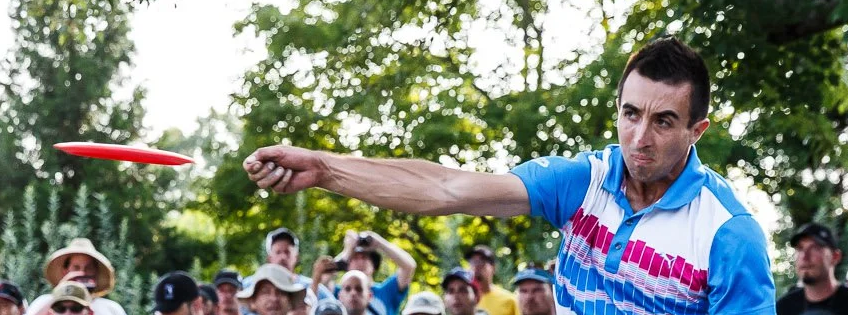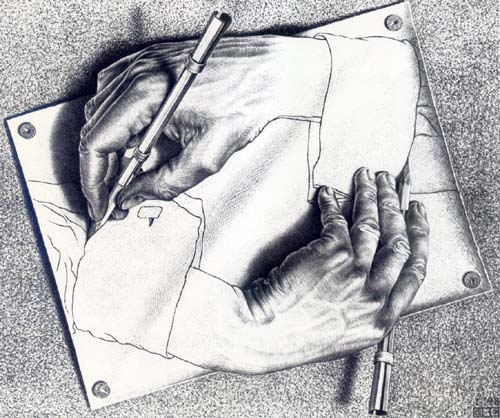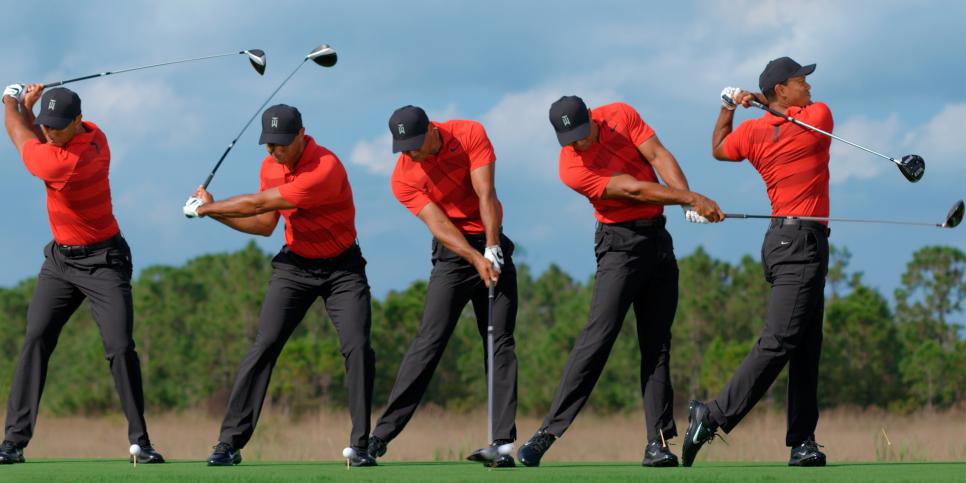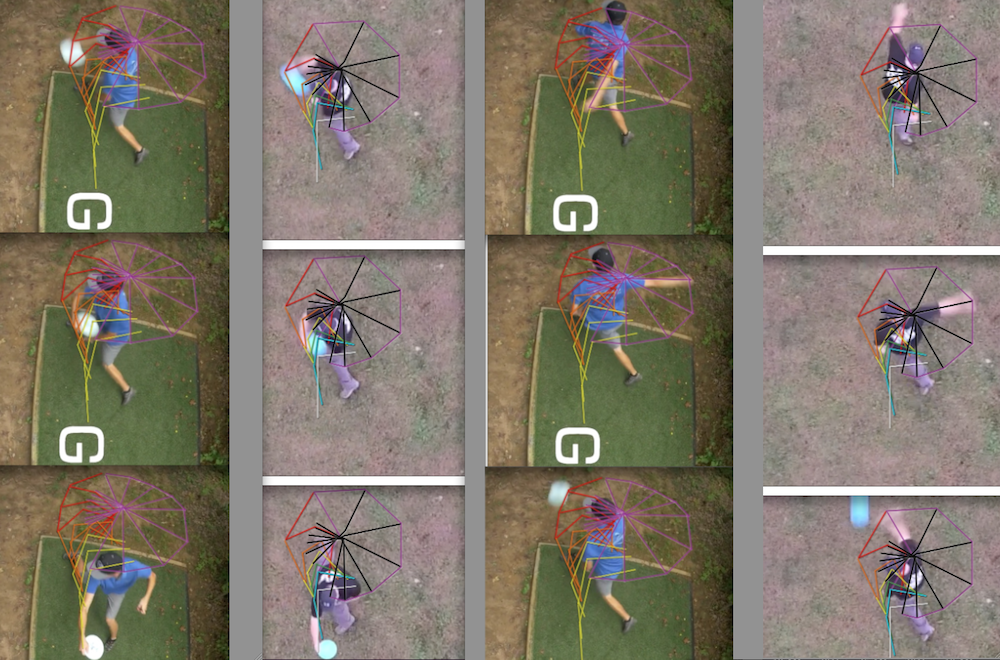Brychanus
* Ace Member *
While I've been writing intensively about form, I inevitably began to metacognate.

In 1982 Richard Dawkins introduced the idea of the Extended Phenotype, which is the that effect genes have on the environment inside or outside the body (this idea introduced added more complexity to academic nature & nurture debates and is not the point of this thread). Extended form includes the courses you play, who you play with, what you interact with and think about, and which ideas and practices you adopt or not.
As a certified headcase (TM), these extended effects have helped me to develop and quiet my mindset. I keep a learner's mindset when I make mistakes. The extended form is something I recognized because of my form that teaches me about my form because of my form ("wut?"*). The practical point I'm making in this thread is that there is a balance between thinking-too-much and not enough.
This weekend I learned lessons about how your extended form grows. My form in terms of the swing mechanics keeps moving along and it was paying off on the course. I was also taking time to choose my highest-chance shots and walking it out and patiently doing my pre-shot routine, which I usually rush too much when I'm with other people. In the pre-shot routine, I focused on only one form aspect I obtained from my coaching to align my on course action with current practice. I would abort a swing if I knew it was about to come out poorly and reset the shot. To me, form now includes the entire pre-shot routine to the result from the moment I choose the line to when the disc stops moving.
But that isn't everything, and the extended form is part of your toolkit and one of your master teachers. It is using your head and the world around you to develop your game and quiet the mind.
How can the extended form help you improve faster?

As form gets better and bigger components seem to snap in place, I started to realize why other things in the extended form matter just as much.
Yesterday I was shooting well, but the holes I was missing were (1) a matter of more speed on the disc coming out and changing the flight (no real complaint there), or (2) a matter of being 5-10 degrees off my line causing me to clip something at speed on a tight gap near the tee or 200' down the fairway. This latter problem is a useful case study for recognizing the presence and role of the extended form.
The Extended Form and the Ride Home

On the ride home I was thinking about the misses. Of course, misses will happen no matter who you are. But what simple things could I work on next?
Current form work: that's a matter of deliberate mentored practice, fine. I am now convinced it is an endless journey. There is always something to work on. And patience is crucial.
Shot choice: disc are coming out differently, evaluate choices. Some shots were clearly caused by mental mistakes, others require me to change my disc or line choices in the context of my form.
But what about those throws that felt great and looked great coming out on laser beam lines with no effort, but were missing by a matter of degrees? Those shots I could only get some of the time even a month ago, but are suddenly coming in spades? This is where the extended form is a master teacher.
Maybe increasingly so, the extended form that emerges as you work on your form matters. Even the way I think in the car on the way home is different than a few months ago. Due to working on my form I have a richer repertoire of knowledge, more vivid memory for my shots, a better proprioceptive sense of my actions, and am quicker to forgive myself for the mistakes and find a thing or two to follow up on, then move on with my day. I have this vast set of voices and knowledge from the community here to guide me and challenge me to grow. The way I watch pros move and make decisions changes from week to week. The advice I take or leave from the people around me on the course differs because my information filters have changed. The way the other Am players around me ask me about movement tips has changed, and meanwhile my mutual respect that everyone can learn something from everyone keeps increasing.
A lesson in visuomotor integration (cf. also the argument about putting in this putting thread)

My current favorite personal example of the extended form happened to me yesterday. This was the first time that I realized that changes to my pre-shot routine are becoming just as fundamental to fix my course performance as my form grind. There is an idea that part of why reproducing motions is so hard is because your brain plans it as though it is the first time. That's an advantage for a flexible system, but is part of why we need to train so hard to help our systems reproduce motions.
Good routines help form a buttress against unwanted variability. SocraDeez pointed out in the pre-shot routine pros often flick their eyes between where their foot will plant and aim point of their line before they start the swing. This habit is something missing from my form, and accounts for some of the unwanted variance in my lines.
I have found that it's really nice to practice those things in solo rounds on the course early in the morning, then consciously remind yourself to do it a couple times a round. Your shots will be better, and you will start to do it unconsciously without freaking out about the details.
The extended form also allowed me to integrate a putting form tip from a very experienced putter with an incredibly high percentage immediately - he had showed me before, but my form wasn't developed enough to integrate it. The extended form is that the way he and I talk on the course is totally different than it was a year ago - it's like a whole different language involving coursecraft and swing tips. He picks up BH tips from me, and I learn FH and now putting tips from him. The extended form also tells me I should spend my next putting practice session just dialing that change in with a handful of deliberate, focused reps rather than just chuck discs at the basket with the old form.
There are few shortcuts, but the extended form teaches you how to pick out these things as you grow. SocraDeez also wrote an excellent post (among other excellent posts in that thread) discussing differences between amateurs and experts and the role of failure as a teacher. I read a lot about this topic in the psychology literature and highly recommend the book Peak by the late Anders Ericsson, which is on my short list of books worth reading before you die. Expertise is a lot of things, and I agree with SocraDeez that it's usually sensationalized and misrepresented in popular outlets, and one thing experts in chicanery have learned is how to sell you snake oil.
*read GEB if you want to spend a heady 777 pages on recursion and related ideas. You'll either love it or hate it or learn to love or hate it.

In 1982 Richard Dawkins introduced the idea of the Extended Phenotype, which is the that effect genes have on the environment inside or outside the body (this idea introduced added more complexity to academic nature & nurture debates and is not the point of this thread). Extended form includes the courses you play, who you play with, what you interact with and think about, and which ideas and practices you adopt or not.
As a certified headcase (TM), these extended effects have helped me to develop and quiet my mindset. I keep a learner's mindset when I make mistakes. The extended form is something I recognized because of my form that teaches me about my form because of my form ("wut?"*). The practical point I'm making in this thread is that there is a balance between thinking-too-much and not enough.
This weekend I learned lessons about how your extended form grows. My form in terms of the swing mechanics keeps moving along and it was paying off on the course. I was also taking time to choose my highest-chance shots and walking it out and patiently doing my pre-shot routine, which I usually rush too much when I'm with other people. In the pre-shot routine, I focused on only one form aspect I obtained from my coaching to align my on course action with current practice. I would abort a swing if I knew it was about to come out poorly and reset the shot. To me, form now includes the entire pre-shot routine to the result from the moment I choose the line to when the disc stops moving.
But that isn't everything, and the extended form is part of your toolkit and one of your master teachers. It is using your head and the world around you to develop your game and quiet the mind.
How can the extended form help you improve faster?

As form gets better and bigger components seem to snap in place, I started to realize why other things in the extended form matter just as much.
Yesterday I was shooting well, but the holes I was missing were (1) a matter of more speed on the disc coming out and changing the flight (no real complaint there), or (2) a matter of being 5-10 degrees off my line causing me to clip something at speed on a tight gap near the tee or 200' down the fairway. This latter problem is a useful case study for recognizing the presence and role of the extended form.
The Extended Form and the Ride Home

On the ride home I was thinking about the misses. Of course, misses will happen no matter who you are. But what simple things could I work on next?
Current form work: that's a matter of deliberate mentored practice, fine. I am now convinced it is an endless journey. There is always something to work on. And patience is crucial.
Shot choice: disc are coming out differently, evaluate choices. Some shots were clearly caused by mental mistakes, others require me to change my disc or line choices in the context of my form.
But what about those throws that felt great and looked great coming out on laser beam lines with no effort, but were missing by a matter of degrees? Those shots I could only get some of the time even a month ago, but are suddenly coming in spades? This is where the extended form is a master teacher.
Maybe increasingly so, the extended form that emerges as you work on your form matters. Even the way I think in the car on the way home is different than a few months ago. Due to working on my form I have a richer repertoire of knowledge, more vivid memory for my shots, a better proprioceptive sense of my actions, and am quicker to forgive myself for the mistakes and find a thing or two to follow up on, then move on with my day. I have this vast set of voices and knowledge from the community here to guide me and challenge me to grow. The way I watch pros move and make decisions changes from week to week. The advice I take or leave from the people around me on the course differs because my information filters have changed. The way the other Am players around me ask me about movement tips has changed, and meanwhile my mutual respect that everyone can learn something from everyone keeps increasing.
A lesson in visuomotor integration (cf. also the argument about putting in this putting thread)

My current favorite personal example of the extended form happened to me yesterday. This was the first time that I realized that changes to my pre-shot routine are becoming just as fundamental to fix my course performance as my form grind. There is an idea that part of why reproducing motions is so hard is because your brain plans it as though it is the first time. That's an advantage for a flexible system, but is part of why we need to train so hard to help our systems reproduce motions.
Good routines help form a buttress against unwanted variability. SocraDeez pointed out in the pre-shot routine pros often flick their eyes between where their foot will plant and aim point of their line before they start the swing. This habit is something missing from my form, and accounts for some of the unwanted variance in my lines.
I have found that it's really nice to practice those things in solo rounds on the course early in the morning, then consciously remind yourself to do it a couple times a round. Your shots will be better, and you will start to do it unconsciously without freaking out about the details.
The extended form also allowed me to integrate a putting form tip from a very experienced putter with an incredibly high percentage immediately - he had showed me before, but my form wasn't developed enough to integrate it. The extended form is that the way he and I talk on the course is totally different than it was a year ago - it's like a whole different language involving coursecraft and swing tips. He picks up BH tips from me, and I learn FH and now putting tips from him. The extended form also tells me I should spend my next putting practice session just dialing that change in with a handful of deliberate, focused reps rather than just chuck discs at the basket with the old form.
There are few shortcuts, but the extended form teaches you how to pick out these things as you grow. SocraDeez also wrote an excellent post (among other excellent posts in that thread) discussing differences between amateurs and experts and the role of failure as a teacher. I read a lot about this topic in the psychology literature and highly recommend the book Peak by the late Anders Ericsson, which is on my short list of books worth reading before you die. Expertise is a lot of things, and I agree with SocraDeez that it's usually sensationalized and misrepresented in popular outlets, and one thing experts in chicanery have learned is how to sell you snake oil.
*read GEB if you want to spend a heady 777 pages on recursion and related ideas. You'll either love it or hate it or learn to love or hate it.


